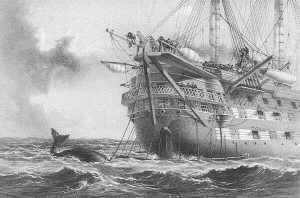Or: The Dot and Dash of Connecting
In 1838, the world changed forever when Sir William Fothergill Cooke and Charles Wheatstone introduced the first commercial electric telegraph in England.
The early telegraph systems were crude, only transmitting Morse code (and competing telegraph codes) a few tens of miles. They soon—and rapidly—began growing longer and more efficient. Within a few short decades, we were stretching cables around the world.

Laying Cable
It's a bit astonishing to think that this technology existed alongside the early telegraphs. The first transatlantic cables were laid in the 1850s by the H.M.S. Agamemnon, a converted British sailing warship.
This sort of thing gets left out of how we often think about history; it was absolutely chock full of anachronism. (Just like today, people didn't adopt then to the newest technology all at once. Sailing ships still existed alongside steam ships and telegraphs. In fact, clipper ships, a type of sailing ship, remained some of the fastest ships on the planet well into the early 1900s.)
As the telegraphs spread, the world got smaller and smaller. The phrase “global village” might have been coined in the 1960s to talk about television, but it really started with the laying of the great undersea telegraph cables.
This was nowhere more strongly exemplified than by the eruption of Krakatoa on August 27, 1883. The news of its eruption actually raced ahead of the shock wave itself, and many people could identify the source of the massive soundwave that traveled around a large portion of the globe before it reached them.
The Krakatoa eruption was the first time the entire world was paying attention to a single natural disaster and, in many ways, it was a real game changer. The British didn’t learn of Napoleon’s defeat until four days after. It took mere hours to hear of the eruption of Krakatoa, halfway around the planet.
We can brag about how much the Internet has changed the planet, but the Internet is merely an extension of what the telegraph cables started.
The wrecks dissolve above us; their dust drops down from afar—
Down to the dark, to the utter dark, where the blind white sea-snakes are.
There is no sound, no echo of sound, in the deserts of the deep,
Or the great grey level plains of ooze where the shell-burred cables creep.Here in the womb of the world—here on the tie-ribs of earth
Words, and the words of men, flicker and flutter and beat—
Warning, sorrow and gain, salutation and mirth -
For a Power troubles the Still that has neither voice nor feet.They have wakened the timeless Things; they have killed
their father Time
Joining hands in the gloom, a league from the last of the sun.
Hush! Men talk to-day o'er the waste of the ultimate slime,
And a new Word runs between: whispering, 'Let us be one!'— “The Deep-Sea Cables” by Rudyard Kipling